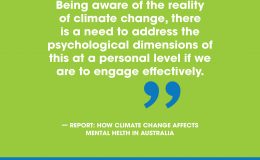By Anna Seth
Acceptance and commitment therapy ( ACT, pronounced ‘act’ like the word) is a framework for psychological treatment, which can be described as part of the a ‘second wave’ of cognitive behavioural therapies.
It was developed in the mid 80s by psychologists Steven Hayes, Kelly Wilson, and Kirk Strosahl and has gained widespread usage in the decades since. It is supported by an increasingly large evidence base. You can read a general overview of the model here.
ACT as a framework has a lot to offer us in supporting our psychological wellbeing in response to climate change and environmental losses. What follows in this article is a brief overview of how the framework could be applied to climate distress. It is based on a presentation which I contributed to a 2020 UTAS event entitled Wellbeing in a Changing Climate. I wish to stress, I am by no means an expert in ACT, and this is simply my take on applying the model to climate related distress, based on my learning and experiences to date.
ACT is based around 6 core processes that work together to build ‘psychological flexibility’
These processes can be summarised as ‘opening up, being present and doing what matters’.
When it comes to climate change it is common to feel strong painful emotions. This is normal, and not inappropriate.
We also experience these feelings in the context of everything else that goes on in our crowded minds. Also normal.
However, it is our natural tendency to get caught up in these thoughts and feelings which is the issue. ACT calls this ‘fusion’.We can get ‘stuck in our heads’ and confuse our thoughts and feelings with facts or problems that we need to ‘fix’.
For example, we might get stuck on the idea ‘why bother, we are doomed anyway’ and we might get so caught up in this that we succumb to despair and hopelessness which prevents us from taking any action at all, and only adds to our unhappiness.
Or we might view these thoughts and feelings as something to be avoided. It is not at all an unreasonable thing to do, given that painful experiences are generally unpleasant. Everyone does it to some extent. It is only a problem when it gets in the way of doing what matters.
The trouble is that none of these strategies work in the long term, and in the case of addressing climate change, there is no more time to waste in avoidance and denial.
We all do it though, because that’s just what minds do. ACT doesn’t get caught up in judging ourselves for struggling in this way, or even in whether a particular thought might be true or not. It is more concerned with whether this struggle brings you closer to living a fulfilling life.
So whether we reason with, fight or ignore our thoughts and feelings ,they will still keep on showing up and some of them will hurt. ACT encourages us to simply open up, make space for them and observe them with curiosity and compassion.
Once we ‘drop the struggle’ with them. We can see them for what they are. Importantly, it doesn’t mean we stop thinking or caring.
In fact our painful internal experiences tell us about what matters to us. For example, we might grieve the loss of species and environments, because we love and value the natural world.
We might feel anger at government inaction on climate policy, because we value justice for those human and non human populations most vulnerable to climate change, and for future generations.
We need to attend to our emotions, because logic and facts are not enough. We need to feel what it means that the earth is warming and we are in the midst of a mass extinction.
To get there, we need to experience different ways of knowing. Ways we might better understand through listening to indigenous wisdom, spending time with nature, or engaging with art, poetry and music.
The original source material for the entirety of human experience is the living world and our relationship with it. While intellect is obviously crucial way if interpreting this, it’s only part of the spectrum of our reality. We need our hearts as much as our minds.
Though practicing mindfulness we are better able to be present to reality, and to feel grounded and centred in this real world experience.
We can see that we are more than our thoughts and feelings.
These internal experiences are like clouds passing through the sky of what ACT calls ‘the observing mind’.
From this space, we can step out of the constant push and pull of our ‘thinking/feeling mind’ and take a broader perspective of our sense of self.
In regards to this broader sense of self, I invite you to consider your ecological self, that is, your self as part of a diverse, rich ecosystem, each part of which has its own inherent worth. This feels intuitively right for many of us.
This shift from the individual to the collective experience creates some important realisations. Firstly we see that we have broader responsibilities than simply to our own needs. Most of us understand this as it applies to our immediate family, and to society, but how does it change when we also expand this to all other lifeforms. What are our obligations then to plants and animals, rivers and forests?
Another aspect of this shift is a sense of shared purpose and with it, shared burden. Not having to go it alone can give us a sense of gratitude, trust and hope. We are bouyed by the support of a fellowship which extends through time and around the globe. It extends to the non human as well, after all the forests are also working their hardest to decarbonise our atmosphere. Here we might like to think about metaphors such as a river carving a path over time, or our own complex immune system, working in concert to defend us from threats.
Understanding our ecological self also helps us to develop self compassion, and with that gives us permission to attend to our own needs.
This can be challenging for activists, as self care can feel like indulgence when there is so much do be done. But when we see our selves as part of a greater whole, we see that caring for ourselves is actually not separate to caring for the planet. When we look after our own wellbeing we are better able to contribute to our families, communities and the world.
There is a clear parallel between understanding that we cannot endlessly mine earth resources and realising that we do not ourselves have bottomless reserves.
So this brings us to the remaining ACT processes of connecting to values and taking committed action. ACT focusses on values rather than goals, which is an important distinction. You may not reach your goal, but you can always act based on your values .
I invite you to consider What kind of life do we want to lead in the face of the painful reality of what is happening to our planet? How might we play our part in the web of life at this crucial time in human history. What painful thoughts and feelings are we willing to accept in the service of a life that matters? I was inspired by a recent lecture by author, ecologist and North American indigenous woman, Robin Wall Kimmerer who asked: “What gifts can you bring to our collective efforts for transformation?”
In summary, facing up to the reality of our situation on an emotional level, and shifting our perspective to a more ecologically connected sense of self can be enormously helpful, but they also make sense in the context of psychological frameworks. ACT is one such framework which can support us to keep on doing what matters, even though the outcome is far from certain. We do it anyway, because it is the right thing to do, and we do it with compassion for ourselves and the broader web of life.

Further ACT and climate resources
For therapists with an interest in ACT you can access this excellent webinar for ANZ ACBS presented by Australian ACT trainer Louise Shepherd here.
The International Association for Contextual Behavioural Science also has a Climate Justice and Action special interest group for members.




